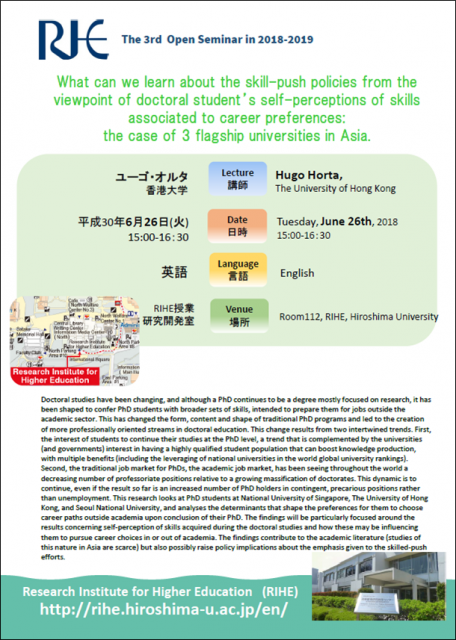The open seminar will be held as follows:
■Date
15:00-16:30, Tuesday, June 26th, 2018
■Venue
Room No. 112, RIHE, Hiroshima University
■Theme
What can we learn about the skill-push policies from the viewpoint of doctoral student’s self-perceptions of skills associated to career preferences: the case of 3 flagship universities in Asia
■Abstracts
Doctoral studies have been changing, and although a PhD continues to be a degree mostly focused on research, it has been shaped to confer PhD students with broader sets of skills, intended to prepare them for jobs outside the academic sector. This has changed the form, content and shape of traditional PhD programs and led to the creation of more professionally oriented streams in doctoral education. This change results from two intertwined trends. First, the interest of students to continue their studies at the PhD level, a trend that is complemented by the universities (and governments) interest in having a highly qualified student population that can boost knowledge production, with multiple benefits (including the leveraging of national universities in the world global university rankings). Second, the traditional job market for PhDs, the academic job market, has been seeing throughout the world a decreasing number of professoriate positions relative to a growing massification of doctorates. This dynamic is to continue, even if the result so far is an increased number of PhD holders in contingent, precarious positions rather than unemployment. This research looks at PhD students at National University of Singapore, The University of Hong Kong, and Seoul National University, and analyses the determinants that shape the preferences for them to choose career paths outside academia upon conclusion of their PhD. The findings will be particularly focused around the results concerning self-perception of skills acquired during the doctoral studies and how these may be influencing them to pursue career choices in or out of academia. The findings contribute to the academic literature (studies of this nature in Asia are scarce) but also possibly raise policy implications about the emphasis given to the skilled-push efforts.
■Bio
Hugo Horta is an Assistant Professor at the Faculty of Education of the University of Hong Kong since September 2014. Before, he was deputy-director of a Research Center in Portugal (IN+/IST), worked as Advisor to the Portuguese Secretary of State of the Ministry of Science, Technology and Higher Education, and served as the Portuguese National delegate to the European Research Area Steering Committee on Human Resources and Mobility. He is currently Coordinating-editor of Higher Education, a leading journal of higher education studies, and sits in the editorial boards of Higher Education Policy; Journal of Higher Education Policy and Management; Asia Pacific Education Review, and the Journal of Higher Education and Science. He is currently enjoying a six months sabbatical spell at the Center for Global Higher Education, Institute of Education, UCL, London, UK and at the Graduate School of Education at Waseda University
■Language
English
[trust-form id=12642]

